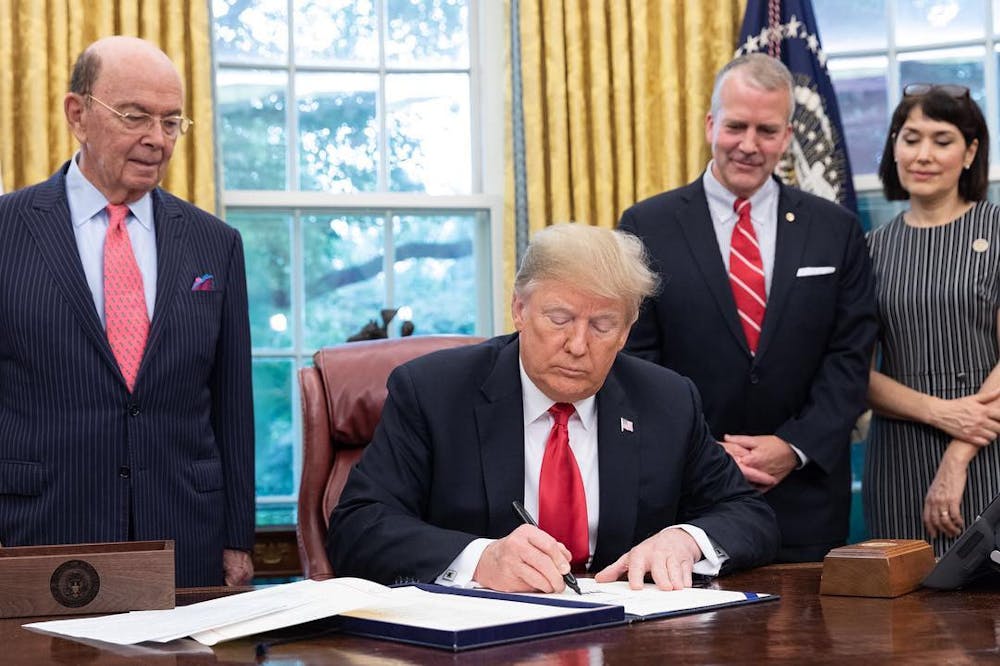By Gauri Patel
Staff Writer
Within one week of taking office, President Donald Trump signed a series of executive orders aimed at reshaping federal policies across various sectors, including immigration, gender and diversity policies, and the Jan. 6 Capitol riot.
Trump declared a national emergency at the United States-Mexico border, allowing the administration to redirect federal resources toward border security. He also ordered the Department of Defense to prioritize sealing the border by expanding detention facilities, supporting the border wall’s construction and facilitating migrant transportation, according to Reuters.
To bolster security, the president authorized the secretary of defense to deploy an additional 1,500 troops, adding to the 2,200 already stationed there. According to Reuters, the White House has emphasized that these military personnel will assist in logistical support rather than direct law enforcement duties.
A major shift in immigration policy includes Trump’s executive order banning asylum for migrants entering illegally. The order states that individuals “engaged in the invasion across the southern border” will be ineligible for asylum. Trump also reinstated the “Remain in Mexico” policy, requiring asylum seekers to stay in Mexico for their U.S. court hearings, even if they are not Mexican citizens.
Additionally, Trump signed an executive order to end birthright citizenship for children of non-citizen parents. Under this measure, citizenship will only be recognized if at least one parent is a U.S. citizen or a legal permanent resident.
According to Reuters, 22 Democratic-led states, the District of Columbia and the city of San Francisco have filed lawsuits, arguing that the birthright citizenship measure directly violates the Constitution, which grants citizenship to anyone born on U.S. soil.
New Jersey attorney general Matthew Platkin vowed to challenge the order in a statement.
“President Trump’s attempt to unilaterally end birthright citizenship is a flagrant violation of our Constitution,” Platkin said. “New Jersey is a proud state of immigrants, and we benefit tremendously from the contributions of birthright citizens…today’s immediate lawsuit sends a clear message to the Trump Administration that we will stand up for our residents and their basic constitutional rights.”
Trump also signed an executive order terminating diversity, equity and inclusion programs within the federal government. The order mandates the elimination of DEI-related training, policies and contracts, with some policies dating back to 1965, according to Reuters.
Critics argue that dismantling DEI initiatives weakens efforts to address generational systemic discrimination and uplift marginalized communities. The American Civil Liberties Union says DEI programs are “essential to creating environments where everyone has a chance to succeed and addressing persistent barriers for individuals to advance in their careers.”
Supporters, on the other hand, claim the move eliminates unfair discrimination against other Americans, such as white people and men, and prioritizes hiring candidates based on merit, according to Reuters.
Trump also issued an executive order pardoning approximately 1,500 individuals convicted for their roles in the Jan. 6 Capitol riot, according to the Associated Press. The order grants clemency to hundreds of rioters, including those charged with assaulting law enforcement and obstructing congressional proceedings.
Trump defended the decision, calling the individuals “patriots” who were unfairly targeted, according to the Associated Press. Supporters argue that the pardons address perceived injustices in the legal system, while critics, including some of Trump's allies, contend that they send the wrong message and could embolden future acts of extremism. The move has sparked widespread controversy and legal scrutiny.
Trump’s recent executive actions have sparked significant national debate, drawing both strong support and legal challenges. As these policies take effect, their full impacts on American society and public policy remain to be seen.







